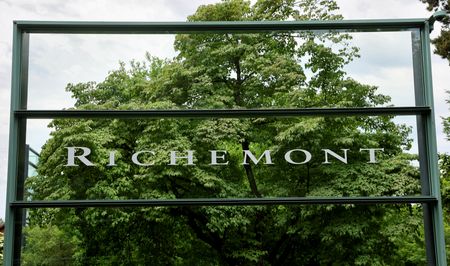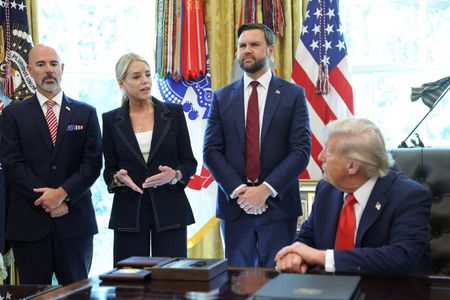By Mimosa Spencer
PARIS (Reuters) -Cartier owner Richemont beat expectations on Friday with a 7% rise in quarterly sales as wealthy shoppers continued to splash out on jewellery, helping the group outperform rivals in the luxury downturn.
Richemont, which also owns jewellery brand Van Cleef & Arpels and watchmaker Piaget, said its jewellery sales jumped 11% in its fourth quarter to the end of March, from a year earlier. That offset an 11% decline in its watches division, where Chinese sales have been hit as the country’s property crisis shrank the appetite for luxury purchases.
Swiss-based Richemont’s total sales for the quarter amounted to 5.17 billion euros ($5.80 billion), a 7% rise in constant currencies, beating a 6% rise forecast in a Visible Alpha consensus cited by HSBC.
Strong jewellery sales were “more than enough” to offset weakness in watches, said JPMorgan, adding it showed Richemont has “truly shifted towards the higher quality, more profitable and less cyclical part of the business.”
Richemont shares rose 5% on Friday morning.
The group, which caters to an extremely wealthy clientele, is viewed by analysts as more resilient to a downturn than other luxury groups that rely more on fashion sales.
“Richemont continued to gain significant market share in jewellery,” Vontobel analyst Jean-Philippe Bertschy said, noting the division accounted for 54% of sales, compared to 36% in 2019.
Bertschy also flagged what he said was spectacular growth and profit, especially when compared with competitor LVMH, which owns jewellery labels Bulgari and Tiffany, although he said Richemont was “not impervious” to the current volatile environment.
Luxury groups started the year with hopes that robust demand in the United States would lift the sector out of its biggest slump in years, but from mid-February, signs emerged of a weakening U.S. economy and tariff announcements in April brought more uncertainty.
Richemont shares have now gained 18% since the start of the year, while shares of Hermes, which also caters to ultra wealthy shoppers, are up 14%. LVMH and Gucci-owner Kering are down 20% and 25% respectively.
PRICE HIKESRichemont executives, who were more cautious than peers in raising prices during the post-pandemic surge in demand, said they were closely watching tariffs in the United States, and will consider “all different options” to mitigate the impact while sticking to a strategy of keeping prices globally at the same level.
“We will adjust,” Richemont Chairman Johann Rupert said in a call with journalists.
Cartier, which cites exchange rate movements as a key reason for price hikes, already raised prices in March.
U.S. tariffs could include a 20% charge on European fashion and 31% for Swiss-produced watches if fully applied, but in April U.S. President Donald Trump paused most of his tariffs for 90 days, setting a general 10% duty rate instead.
Richemont’s peer Hermes has said it is passing the full amount of tariffs to customers in the United States.
Fears of a global recession have prompted downward revisions in estimates with consultancy Bain lowering its annual sales forecast for luxury goods to a likely 2% to 5% drop, following the sector’s 1% decline in 2024.
($1 = 0.8921 euros)
(Reporting by Mimosa Spencer, additional reporting by Anna Pruchnicka in Gdansk; Editing by Friederike Heine, Barbara Lewis and Susan Fenton)











